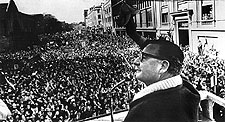A leftist revolutionary or a reformist democrat? A committed Marxist or a constitutionalist politician? An ethical and moral man or, as Richard Nixon called him, a "son of a bitch"? In SALVADOR ALLENDE, acclaimed Chilean filmmaker Patricio Guzmán (The Battle of Chile and Chile, Obstinate Memory) returns to his native country thirty years after the 1973 military coup that overthrew Chile's Popular Unity government to examine the life of its leader, Salvador Allende, both as a politician and a man.
Using rare archival footage, family photos, interviews with Allende's friends, professional colleagues, his daughters and other relatives as well as UP militants, workers, journalists, his personal secretary and Edward Korry, former U.S. Ambassador to Chile, SALVADOR ALLENDE portrays the life, times and political formation of the Valparaiso-born doctor who was active in Socialist Party politics as a senator and who ran unsuccessfully for President three times before finally being elected in 1970.

The film focuses on the tumultuous three years following Allende's election, and the declaration of his socialist program, "la via chilena," which nationalized large-scale industries and began an agrarian reform program. Former U.S. Ambassador Korry provides an insider's account of President Nixon and Henry Kissinger's determination to thwart Allende, but he is unrepentant about the CIA-sponsored coup that overthrew the Chilean government.

SALVADOR ALLENDE also reveals little-known, more intimate aspects of the man, with moving personal reminiscences of his sense of humor, his remarkable energy, personal charisma and popular political appeal. Through archival footage and eyewitness and participant accounts, the film re-creates the military assault on the Moneda, Allende's last radio broadcast to the people of Chile, and rare photos and footage documenting the final actions of Allende and his staff on that day, including his suicide.
Guzmán's personalized voice-over commentary provides a compelling narrative thread for this political biography, one which, in his attempt to understand the impact of Allende on his own life and his nation's political history, also serves to illuminate this controversial and inspirational public figure for an international audience.
“The definitive portrait of the Chilean leader.” —Documentary Magazine
"Compelling and moving… The depth of Chile's and the world's loss is seen in Guzman's close-ups of the old men who were there and who live with their regret."—The Hollywood Reporter
"A haunting exploration of the Allende paradox… deserves to be widely seen."—Andrew O'Hehir, Salon.com
"Poetic and powerful."—Screen International
"A formidable introduction to that period, among the darkest of the last century."—Ciné Live
2007 Latin American Studies Association Film Festival
2006 Palm Springs International Film Festival
2005 Miami International Film Festival
2004 Toronto International Film Festival
2004 Cannes Film Festival
2004 San Sebastian International Film Festival
2004 Sheffield Documentary Festival
Best Documentary, 2004 Lima Latin American Film Festival
